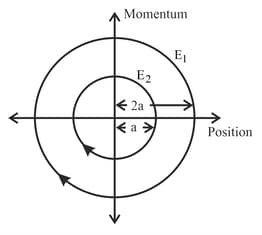The graph of a particle undergoing simple harmonic motion is shown below. The acceleration of the particle at is
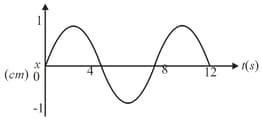

Important Questions on Linear and Angular Simple Harmonic Motion
A uniform rod of length (L) and mass (M) is pivoted at the centre. Its two ends are attached to two springs of equal spring constants The springs are fixed to rigid supports as shown in the figure, and the rod is free to oscillate in the horizontal plane. The rod is free to oscillate in the horizontal plane. The rod is gently pushed through a small angle (theta) in one direction and released. The frequency of oscillation is. ?
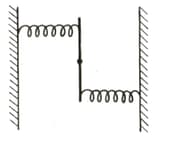
A small block is connected to one end of a massless spring of unstretched length . The other end of the spring is fixed as shown in the figure. The system lies on a horizontal frictionless surface. The block is stretched by and released from rest at . lt then executes simple harmonic motion with angular frequency. . Simultaneously at , a small pebble is projected with speed from point at an angle of as shown in the figure. Point P is at a horizontal distance of . If the pebble hits the block at , the value of is
(take )
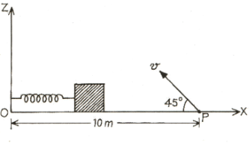
A metal rod of length and mass is pivoted at one end. A thin disk of mass and radius () is attached at its centre to the free end of the rod. Consider two ways the disc is attached:
(Case ): The disc is not free to rotate about its centre and
(Case ): the disc is free to rotate about its centre.
The rod- disc system performs SHM in vertical plane after being released from the same displaced position. Which of the following statement(s) is (are) true?
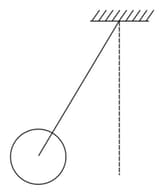
A particle of mass is attached to one end of a massless spring of force constant, lying on a frictionless horizontal plane. The other end of the spring is fixed. The particle starts moving horizontally from its equilibrium position at time with an initial velocity when the speed of the particle is .It collides elastically with a rigid wall. After this collision.
Two independent harmonic oscillators of equal masses oscillate about the origin with angular frequencies and and have total energies and , respectively. The variations of their momenta with positions are shown in figures. If and , then the correct equation(s) is (are),
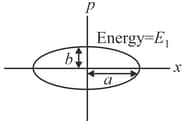
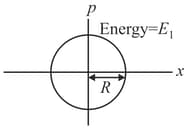
A block with mass is connected by a massless spring with stiffness constant to a rigid wall and moves without friction on a horizontal surface. The block oscillates with small amplitude about an equilibrium position. Consider two cases :
when the block is at ; and
when the block is at In both the cases, a particle with mass is softly placed on the block after which they stick to each other.
Which of the following statement(s) is(are) true about the motion after the mass is placed on the mass ?
Phase space diagrams are useful tools in analysing all kinds of dynamical problems. They are especially useful in studying the changes in motion as initial position and momentum are changed. Here we consider some simple dynamical systems in one dimension. For such systems, phase space is a plane, in which position is plotted along horizontal axis and momentum is plotted along vertical axis. The phase space diagram is vs. curve in this plane. The arrow on the curve indicates the time flow. For example, the phase space diagram for a particle moving with constant velocity in a straight line as shown in the figure. We use the sign convention in which position and momentum upwards(or to right) are positive and downwards (or to left) is negative.
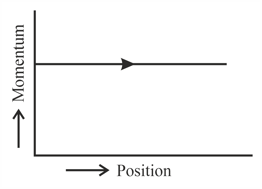
The phase space diagram for the simple harmonic motion is a circle centered at the origin. In the figure, the two circles represent the same oscillator but for different initial conditions, and and are the total mechanical energies respectively. Then
